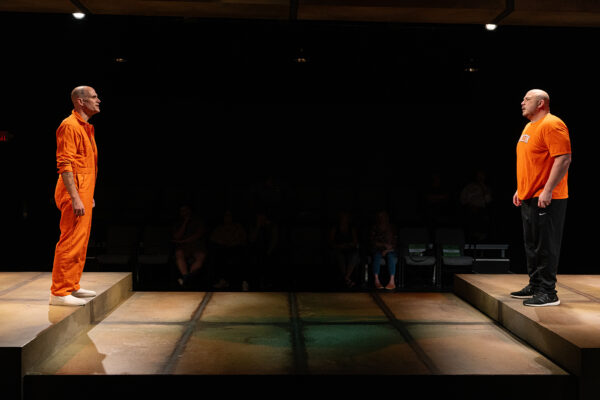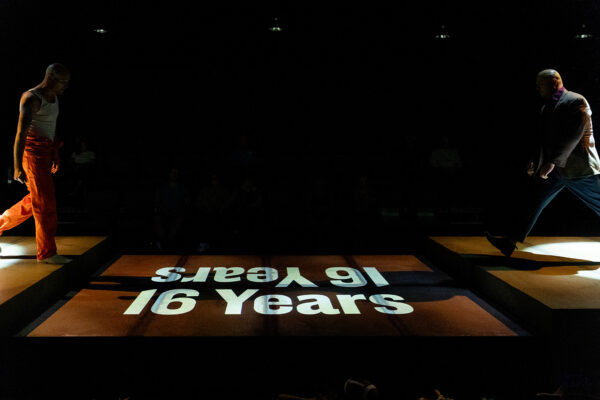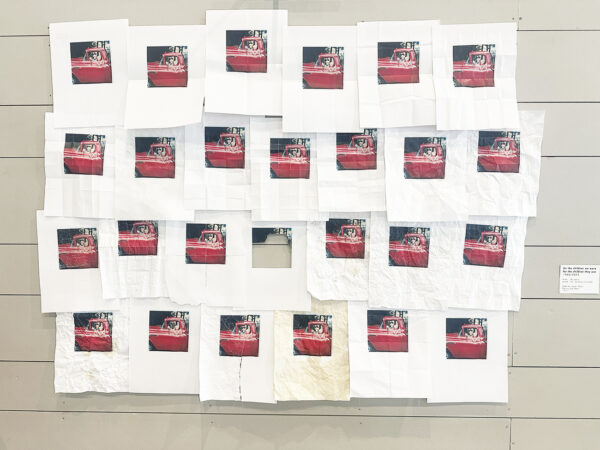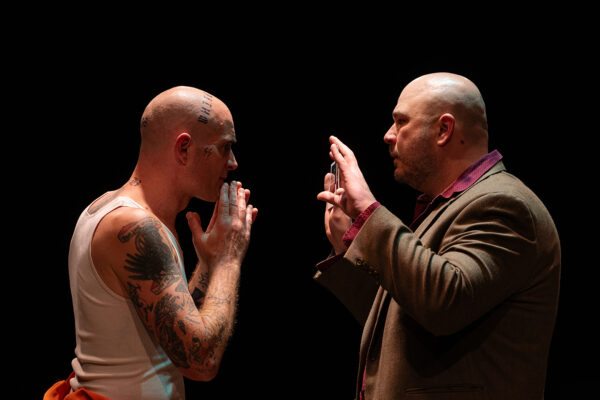Amphibian Stage’s current production Rift or White Lies, directed by Lily Wolff, raises powerful questions about the legacy of intergenerational trauma, the effects of toxic masculinity, and the tension between truth and loyalty within family bonds. Inspired by playwright Gabriel Jason Dean’s personal history, the play centers on two brothers — one who is a white supremacist incarcerated for murder, and the other who is a successful writer and university educator. What drew me most to the story was its exploration of the challenges in connecting with someone whose beliefs are starkly opposed to one’s own. Amid an increasingly polarized political climate, the widening chasm between the right and left has fractured many families, including my own.

Jonathan R. Freeman and Taylor Harris in “Rift or White Lies” at Amphibian Stage. Photo: Evan Michael Woods
The two-hour, emotionally charged production is brilliantly performed by Taylor Harris and Jonathan R. Freeman. Known as the “inside brother” and the “outside brother,” the characters navigate the painful complexities of attempting and often failing to maintain a relationship. The familiar phrase “walking a mile in another’s shoes,” often invoked to emphasize the importance of empathy, takes on new resonance here as the two actors switch roles each night throughout the run of the play, offering audiences multiple perspectives on the brothers’ dynamic.
The “rift” in the play’s title implies a break or division, and the production mirrors this both thematically and structurally. Major fissures between the brothers are measured in years of separation, with each scene introduced by a projected number on the darkened stage indicating the years of the inside brother’s incarceration and the time elapsed between visits. This simple but effective device highlights the growing emotional and temporal distance between them.

Jonathan R. Freeman and Taylor Harris in “Rift or White Lies” at Amphibian Stage. Photo: Evan Michael Woods
Set designer Leah Mazur created a stage that visually reinforces the division felt by the brothers. The minimalist set is physically split down the center, while childhood relics — a weathered red wagon, a baseball bat and glove, and a deflated basketball — surround the stage. These objects evoke memories that have been lost or suppressed.

Leah Mazur (with images from Gabriel Jason Dean and Danny Joe Dean), “for the children we were, for the children they are,” 1983/2025, wood, ink, memory on paper, 4 x 5 feet
Mazur’s multidisciplinary background in scenic, lighting, and costume design, and her work with interactive installation and performance art, is evident in the immersive experience she creates. Before and after the performance, the theater lobby features a poignant photo installation: a grid of copies of a single photograph showing the playwright and his brother as young boys, leaning out the window of a red pickup truck. The distressed images, altered through folding, tearing, and cutting, foreshadow the fragmented relationship depicted onstage. This photograph also features in a crucial early scene where the brothers bond over a shared memory. The emotional resonance is deepened after the play’s conclusion with an audio recording, broadcast in the lobby, of the real-life brothers reflecting on their memories tied to the image.
The second half of the play’s title, White Lies, traditionally refers to harmless untruths meant to spare another’s feelings. Here, the title is ironic: the lies the brothers tell are anything but harmless. In the opening scene, they accuse each other of dishonesty — one charges the other with embellishment, the other with omission. Lies of omission form the crux of the play’s devastating narrative, as harrowing stories of three generations of sexual abuse are revealed.

Jonathan R. Freeman and Taylor Harris in “Rift or White Lies” at Amphibian Stage. Photo: Evan Michael Woods
In contrast to white lies, black lies — those told to cause harm or for personal gain — loom large in the plot. Without giving too much away, these betrayals are so profound that the possibility of forgiveness becomes an open, painful question. The inside brother, hardened by years of incarceration, justifies his lies as necessary for survival, raising difficult questions about whether survival can ever excuse betrayal.
Rift or White Lies is a deeply affecting production that confronts audiences with the uncomfortable realities of loyalty, betrayal, and the search for redemption. Dean’s personal narrative, coupled with the searing performances and thoughtful stage design, leaves a lasting impression. In an era when many families find themselves divided by ideology and personal pain, this play reminds us that reconciliation is neither simple nor guaranteed. However, the effort to understand and listen to one another, even when fraught and imperfect, is profoundly human.
Rift or White Lies is on view at Amphibian Stage in Fort Worth through Sunday, May 11, 2025.


